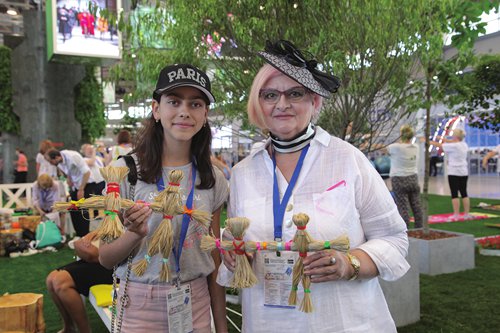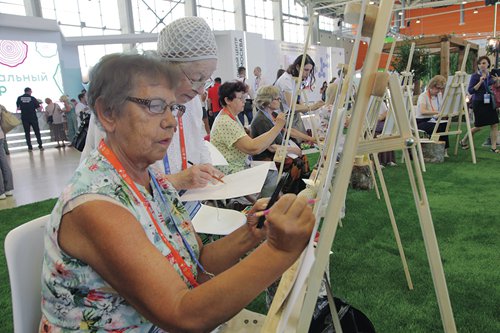METRO SHANGHAI / METRO SHANGHAI
Russian capital launches project to better serve its growing number of senior citizens
Moscow longevity
Moscow resident Bruma Tatiana, 65, carefully drew a watercolor plant on an easel. Seated at the city's VDNH Park and Exhibition Center along with a dozen local elderly ladies, she leisurely colored every petal of the flower under the curious gaze of visitors.
It was at the Third Forum of Social Innovations of the Regions being held in Moscow between June 19 and 21, where a series of issues related to social development and residents' livelihoods were exhibited and discussed, including education, health care and longevity.
During the three-day event, Tatiana as well as more than 100 other elderly people took part in several activities such as painting, dancing, gymnastics and handicrafts at the forum's Longevity Park pavilion to show the visitors what their retired life is like after the local government launched a project named Moscow Longevity in March 2018.
Classes for free
The aim of the Moscow Longevity project for senior citizens is to provide more opportunities for leisure activities for the elderly generation, which was introduced by Vladimir Filippov, deputy head of the Department of Labor and Social Protection of the Population of the City of Moscow.
The project offers local elderly people various classes that include general physical training, dancing, gymnastics, crafts, drawing and chess. More academic lessons such as information technology (IT) and English are available as well. Muscovite females and males respectively aged 55 to 60 or above are able to take as many classes as they like for free, Filippov said.
Tatiana attended three of the project's classes: drawing, dancing and gymnastics. Each class is held twice a week and lasts one hour. "These classes are not difficult for me," she told the Global Times. "They are designed according to us old people's learning ability, so I can easily grasp the knowledge and skills."
After she retired five years ago, Tatiana's time was once filled with housework and looking after her nine grandkids. Being busy with household affairs all day made her exhausted. "But now I have become much more energetic by taking the classes, and I've made friends here," she added.
The changes in Tatiana's life echo the main purposes of this project. "In Moscow we have more than 3 million people aged 55 and older, and the number is growing," Filippov said to the Global Times. "For this expanding group, how to strive against loneliness, as well as how to make good use of their free time, are two challenges that the Moscow Longevity project is trying to help deal with."
To date some 160,000 elderly Muscovites have been constantly engaged in this project, according to the project staff. Ladies seem particularly interested in it as 87 percent of its participants are females.
Ellada Baranova, 65, has been part of the project for a year. She registered for as many as 12 classes including breathing exercising and model dressing, which makes her retired life rich and colorful.
"(My daily life is) full of lessons. Fitness at 9 am, running at 11 am..." she explained, adding that she is even busier than when she was at work.
"But taking the classes has brought me a lot of pleasure. I make friends there, and we chat and share something new with each other, so I'm not isolated anymore," Baranova told the Global Times. "I really enjoy it."

Elderly people benefit
The project's classes are held at community centers across the city, Filippov said. Senior citizens can take the classes near where they live.
Irina Chikova, a local community center staffer, teaches gymnastics and Chinese painting under the project. "I teach four times a week, attracting 10 to 20 grannies each time," she said at the forum's Longevity Park pavilion, where she drew a purple plant as an example for her students.
Unlike younger people who are still busy making money, retired elderly people usually enjoy more time and energy to do what they like, Chikova said.
"They have the motivation to learn, and what they learn here can benefit them," she told the Global Times. "The two lessons I teach, for example, are gymnastics which is good for aging people's body, especially their back, and Chinese painting can improve their concentration and mood."
$50 million per year
The average life expectancy of Moscow residents has reached 78 years old, eight years longer than in 2010, Filippov introduced.
Similar to many other metropolises around the world, Moscow's aging population is increasing fast. "The life expectancy of Muscovites is expected to reach 86 years old by 2030," he said. "At that time, Moscow may have over 4 million retired people, 1 million more than the current number."
Therefore, the local government launched the Moscow Longevity project to better serve this growing group, costing $50 million per year.
"According to a recent survey, one third of the participants said they feel better physically and mentally after taking the project's classes," Filippov told the Global Times.

It was at the Third Forum of Social Innovations of the Regions being held in Moscow between June 19 and 21, where a series of issues related to social development and residents' livelihoods were exhibited and discussed, including education, health care and longevity.
During the three-day event, Tatiana as well as more than 100 other elderly people took part in several activities such as painting, dancing, gymnastics and handicrafts at the forum's Longevity Park pavilion to show the visitors what their retired life is like after the local government launched a project named Moscow Longevity in March 2018.
Classes for free
The aim of the Moscow Longevity project for senior citizens is to provide more opportunities for leisure activities for the elderly generation, which was introduced by Vladimir Filippov, deputy head of the Department of Labor and Social Protection of the Population of the City of Moscow.
The project offers local elderly people various classes that include general physical training, dancing, gymnastics, crafts, drawing and chess. More academic lessons such as information technology (IT) and English are available as well. Muscovite females and males respectively aged 55 to 60 or above are able to take as many classes as they like for free, Filippov said.
Tatiana attended three of the project's classes: drawing, dancing and gymnastics. Each class is held twice a week and lasts one hour. "These classes are not difficult for me," she told the Global Times. "They are designed according to us old people's learning ability, so I can easily grasp the knowledge and skills."
After she retired five years ago, Tatiana's time was once filled with housework and looking after her nine grandkids. Being busy with household affairs all day made her exhausted. "But now I have become much more energetic by taking the classes, and I've made friends here," she added.
The changes in Tatiana's life echo the main purposes of this project. "In Moscow we have more than 3 million people aged 55 and older, and the number is growing," Filippov said to the Global Times. "For this expanding group, how to strive against loneliness, as well as how to make good use of their free time, are two challenges that the Moscow Longevity project is trying to help deal with."
To date some 160,000 elderly Muscovites have been constantly engaged in this project, according to the project staff. Ladies seem particularly interested in it as 87 percent of its participants are females.
Ellada Baranova, 65, has been part of the project for a year. She registered for as many as 12 classes including breathing exercising and model dressing, which makes her retired life rich and colorful.
"(My daily life is) full of lessons. Fitness at 9 am, running at 11 am..." she explained, adding that she is even busier than when she was at work.
"But taking the classes has brought me a lot of pleasure. I make friends there, and we chat and share something new with each other, so I'm not isolated anymore," Baranova told the Global Times. "I really enjoy it."

Ellada Baranova and her granddaughter Diana pose with their handmade crafts at the Third Forum of Social Innovations of the Regions in Moscow. Photo: Huang Lanlan/GT
Elderly people benefit
The project's classes are held at community centers across the city, Filippov said. Senior citizens can take the classes near where they live.
Irina Chikova, a local community center staffer, teaches gymnastics and Chinese painting under the project. "I teach four times a week, attracting 10 to 20 grannies each time," she said at the forum's Longevity Park pavilion, where she drew a purple plant as an example for her students.
Unlike younger people who are still busy making money, retired elderly people usually enjoy more time and energy to do what they like, Chikova said.
"They have the motivation to learn, and what they learn here can benefit them," she told the Global Times. "The two lessons I teach, for example, are gymnastics which is good for aging people's body, especially their back, and Chinese painting can improve their concentration and mood."
$50 million per year
The average life expectancy of Moscow residents has reached 78 years old, eight years longer than in 2010, Filippov introduced.
Similar to many other metropolises around the world, Moscow's aging population is increasing fast. "The life expectancy of Muscovites is expected to reach 86 years old by 2030," he said. "At that time, Moscow may have over 4 million retired people, 1 million more than the current number."
Therefore, the local government launched the Moscow Longevity project to better serve this growing group, costing $50 million per year.
"According to a recent survey, one third of the participants said they feel better physically and mentally after taking the project's classes," Filippov told the Global Times.

Elderly Muscovites practice painting at the Third Forum of Social Innovations of the Regions in Moscow. Photo: Huang Lanlan/GT

